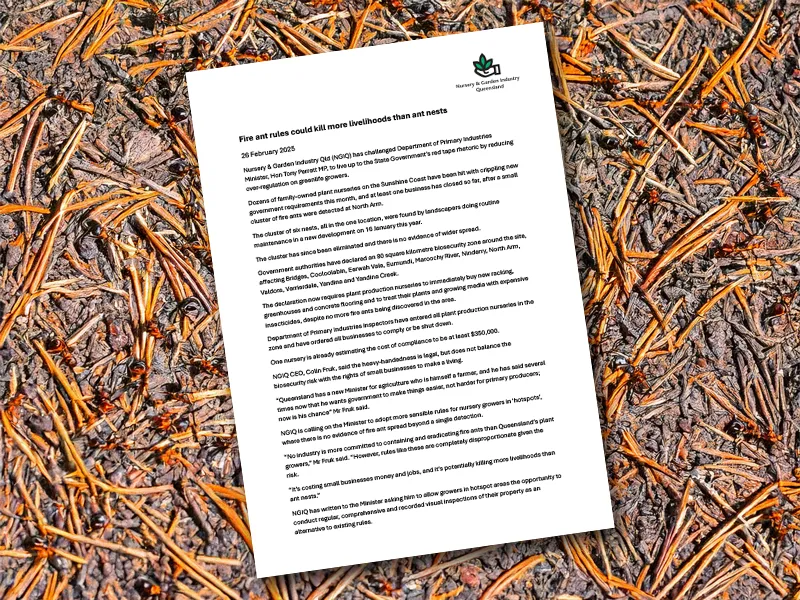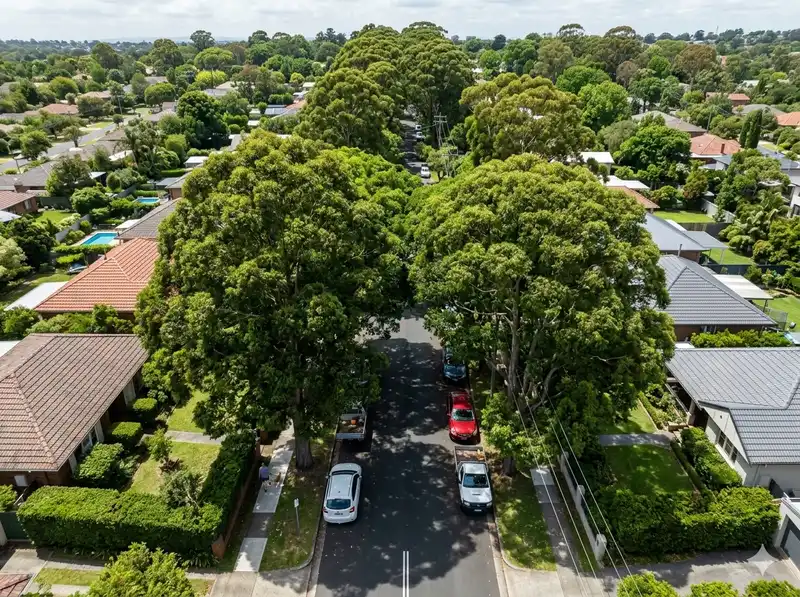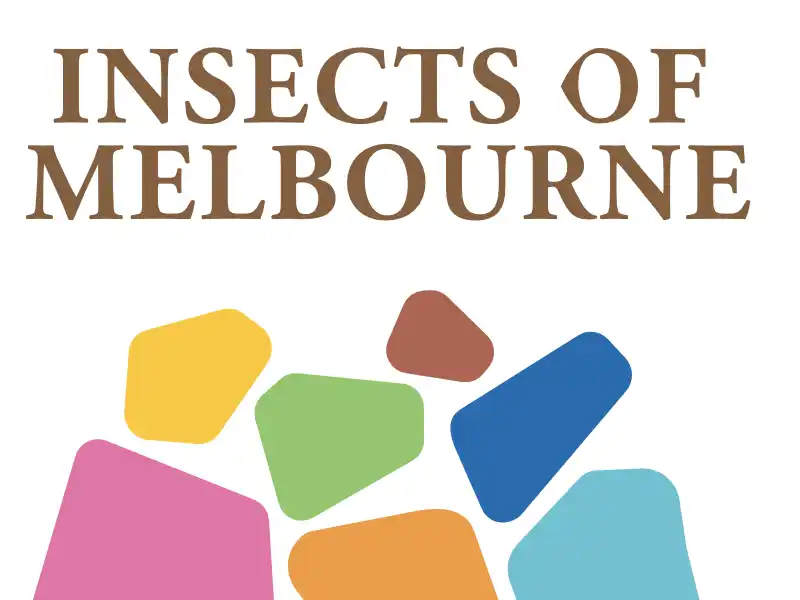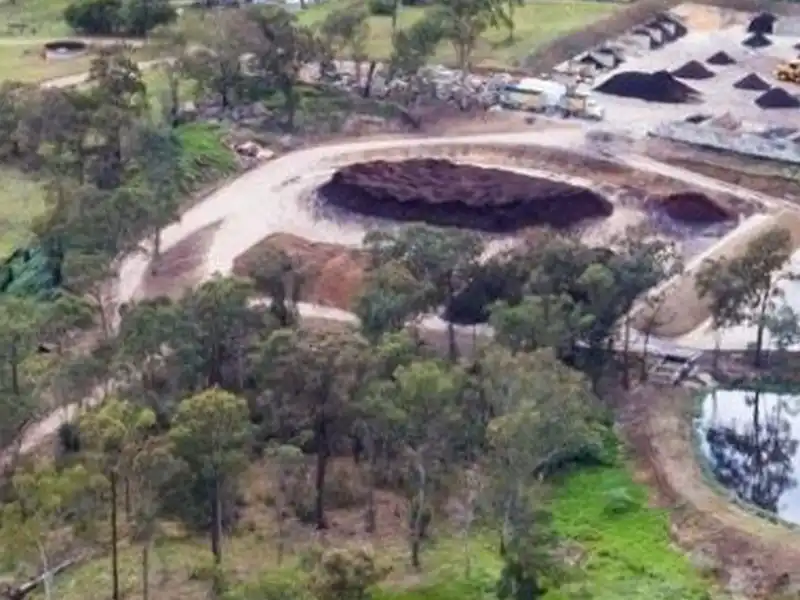26 February 2025
Nursery & Garden Industry Qld (NGIQ) has challenged Department of Primary Industries Minister, Hon Tony Perrett MP, to live up to the State Government’s red tape rhetoric by reducing over-regulation on greenlife growers.
Dozens of family-owned plant nurseries on the Sunshine Coast have been hit with crippling new government requirements this month, and at least one business has closed so far, after a small cluster of fire ants were detected at North Arm.
The cluster of six nests, all in the one location, were found by landscapers doing routine maintenance in a new development on 16 January this year.
The cluster has since been eliminated and there is no evidence of wider spread.
Government authorities have declared an 80 square kilometre biosecurity zone around the site, affecting Bridges, Cooloolabin, Eerwah Vale, Eumundi, Maroochy River, Ninderry, North Arm, Valdora, Verrierdale, Yandina and Yandina Creek.
The declaration now requires plant production nurseries to immediately buy new racking, greenhouses and concrete flooring and to treat their plants and growing media with expensive insecticides, despite no more fire ants being discovered in the area.
Department of Primary Industries inspectors have entered all plant production nurseries in the zone and have ordered all businesses to comply or be shut down.
One nursery is already estimating the cost of compliance to be at least $350,000.
NGIQ CEO, Colin Fruk, said the heavy-handedness is legal, but does not balance the biosecurity risk with the rights of small businesses to make a living.
“Queensland has a new Minister for agriculture who is himself a farmer, and he has said several times now that he wants government to make things easier, not harder for primary producers; now is his chance” Mr Fruk said.
NGIQ is calling on the Minister to adopt more sensible rules for nursery growers in ‘hotspots’, where there is no evidence of fire ant spread beyond a single detection.
“No industry is more committed to containing and eradicating fire ants than Queensland’s plant growers,” Mr Fruk said. “However, rules like these are completely disproportionate given the risk.
“It’s costing small businesses money and jobs, and it’s potentially killing more livelihoods than ant nests.”
NGIQ has written to the Minister asking him to allow growers in hotspot areas the opportunity to conduct regular, comprehensive and recorded visual inspections of their property as an alternative to existing rules.
“Most plant growers simply do not have six-figure bank balances to instantly comply with these draconian, one-size-fits-all regulations,” Mr Fruk said. “All we are asking is for some common sense, and if a second cluster is found then we are fully prepared to adopt all the biosecurity measures in the Act.”
Simon Smith, general manager of Blue Sky Nursery at North Arm, said all of Blue Sky’s plants would have to be dosed with bifrenthrin before they could be delivered to retailers.
The chemical, in granular form, can be mixed with soil when potting plants but plants already potted would have to be sprayed, he said.
“We’ve got hundreds of thousands of plants here, and not a single fire ant,” Mr Smith said. “We’re going to have to drench every single plant that goes off our site, every day. That’s five to eight truckloads of plants every day. There is no government support for the cost of the chemicals, plus we don’t want to put harsh chemicals into the environment when there’s not a good case for it.”
Previously, nurseries were able to continue growing plants and transporting plants out of and between biosecurity zones by training staff to identify fire ants, and by submitting a customised fire ant prevention plan to the government for approval.
NGIQ said there are no winners in the way the current laws are set up.
“The authorities are wasting their time, our growers’ businesses are being pushed into debt, and we’re not eliminating any ants in the process. It’s the definition of bureaucracy, and we really need the Minister to step in and help,” Mr Fruk said.
While production nurseries have significant potential for transporting fire ants, the industry is used to managing biosecurity risks. There has never been a recorded case of fire ants being transmitted from Queensland to another state via a potted plant.
Queensland Farmers’ Federation Jo Sheppard said the horticulture sector is overly targeted when it comes to fighting fire ants, while other industries are not adequately monitored.
“Biosecurity is everyone’s risk and everyone’s responsibility. It is high time that we engage the sectors outside of agriculture to play an active role in minimising and taking responsibility for biosecurity. It is not fair that the burden is only borne by the Ag sector,” she said.
Nursery & Garden Industry Queensland is the state peak body representing the professional nursery industry in Queensland, incorporating production nurseries, retail nurseries, garden centres, and agents for allied products. It was formed in 1934 as a professional body for growers and sellers of quality plans and celebrated 90 years of supporting the industry last year.
- ends –
Contact: Colin Fruk, 0409 622 297 ceo@ngiq.asn.au





